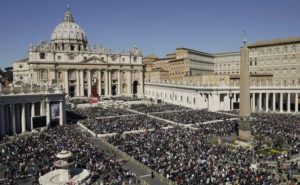 Article by Dr. Sam Storms entitled “10 THINGS YOU SHOULD KNOW ABOUT THE 144,000 IN THE BOOK OF REVELATION” (original source here)
Article by Dr. Sam Storms entitled “10 THINGS YOU SHOULD KNOW ABOUT THE 144,000 IN THE BOOK OF REVELATION” (original source here)
Will the debate ever end about the identity of the 144,000 servants in Revelation 7? Perhaps not, but I hope these ten truths will contribute something to our understanding of who they are and what they do. We read that 12,000 are “sealed from every tribe of the sons of Israel” (Rev. 7:4).
(1) The list of tribes in Revelation 7 corresponds to none of the nearly twenty different variations found in the OT. Judah, listed first here, is found in that position in the OT only when the tribes are arranged geographically, moving from south to north (Num. 34:19; Josh. 21:4; Judges 1:2; 1 Chron. 12:24). The only exception to this is Numbers 2:3 (followed by 7:12; 10:14). Perhaps Judah’s priority here “emphasizes the precedence of the messianic king from the tribe of Judah (cf. Gen. 49:10; 1 Chron. 5:1-2) and thus refers to a fulfillment of the prophecy in Gen. 49:8 that the eleven other tribes ‘will bow down’ to Judah” (Beale, 417).
(2) One can hardly fail to note that the tribes of Dan and Ephraim are omitted. One tradition believed that the Antichrist was to come from the tribe of Dan (based on a misinterpretation of Jer. 8:16 and first found in Irenaeus, @ 200 a.d.). Dan was also closely associated with idol worship (Judg. 18:16-19; 1 Kings 12:28-30; cf. Gen. 49:17; Judges 18:30; Jer. 8:16), as was Ephraim (Hosea 4:17-14:8). In Revelation 7, Joseph and Manasseh substitute for Dan and Ephraim. In the final analysis, there is no clear reason for this and we may never know why.
(3) There are several noticeable differences between the 144,000 in vv. 4-8 and the great multitude in vv. 9-17. Notice that the first group is specifically numbered (144,000) whereas the second is innumerable. Furthermore, the members of the 144,000 are all taken from but one nation, Israel, whereas those in the innumerable multitude are taken from “every nation and tribe and people and language” (7:9). Another difference is their location: the 144,000 appear to be on earth, whereas the multitude is in heaven, before the throne of God (7:9). Finally, the 144,000 are in imminent peril and thus require divine protection, whereas the multitude are in a condition of absolute peace and joy.
Do these differences mean that the two groups are entirely different, or is it the same group viewed from different perspectives, at different stages of their existence and experience? I believe it is the latter. More on this in a moment.
(4) These in 7:4-8 are surely identical with the 144,000 mentioned in Rev. 14:1-5. In both cases it is said that they received the seal of God on their “foreheads” (7:3 and 14:1). In 14:3 they are described as those who had been “redeemed from the earth” and again in 14:4 they were “redeemed from mankind”. This echoes Revelation 5:9 where the Lamb is said to have “ransomed” or “redeemed” for God people from every tribe, tongue, people, and nation. This same phrase is used again in Revelation 7:9 to describe the innumerable multitude. This would seem to indicate that the 144,000 = the innumerable multitude = the redeemed of all ages, and not some special remnant of humanity. Continue reading


